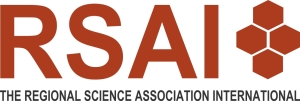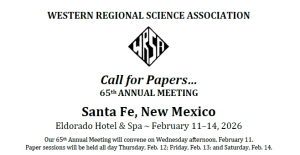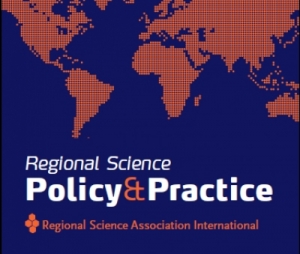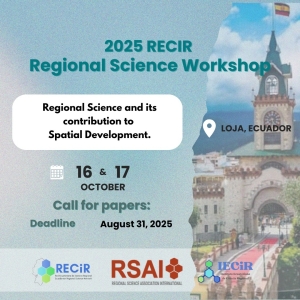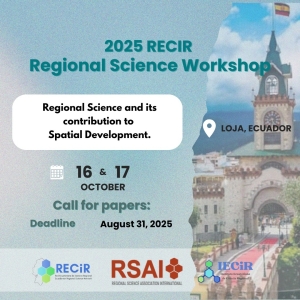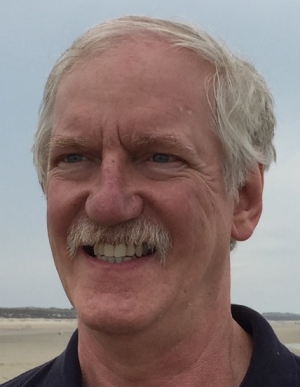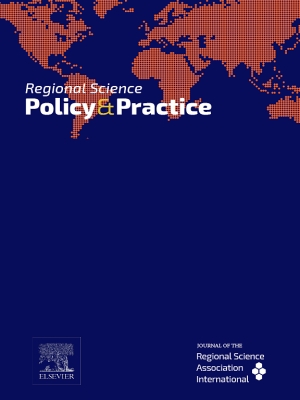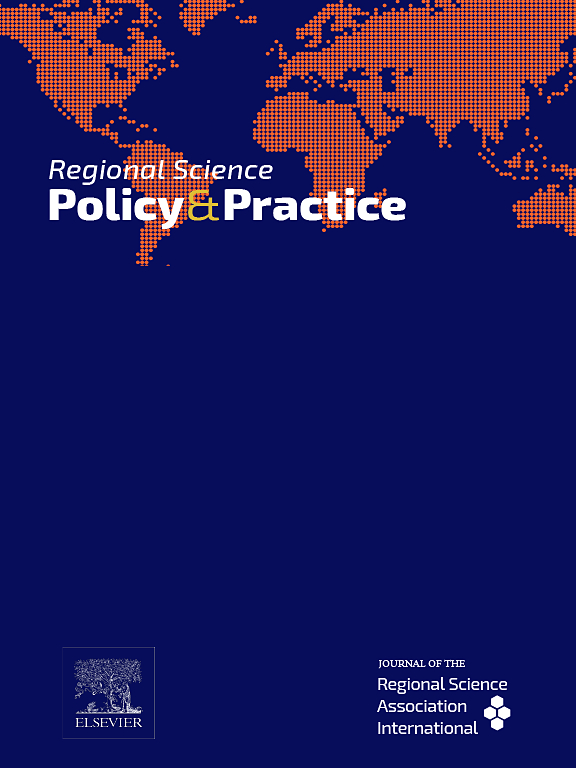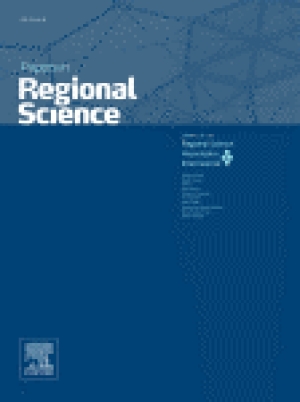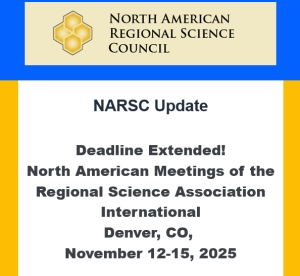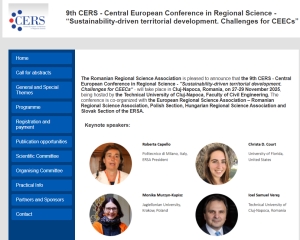Regional Science Policy and Practice
Elisabete Martins
Call for Applications | 2025 RSAI Dissertation Award, Deadline: August 31, 2025
2025 RSAI Best Dissertation in Regional Science
Call for submissions
Deadline for the applications: August 31, 2025
The Regional Science Association International (RSAI) invites submissions for the annual competition for the Best Doctoral Dissertation in Regional Science. Regional science is an interdisciplinary field concerned with theory, method, and application of regional, urban and rural, geographic and spatial investigations and analyses.
The winner will be decided by the Selection Committee and will receive a cash award of 750 Euros. Award announcements will be made at the North American Meetings of the RSAI, where participants in the competition are strongly encouraged to be present. The Selection Committee reserves the right to not make an award. Decisions made by the Selection Committee are final.
Eligibility:
- A dissertation completed in any PhD program in any country is eligible,
- A dissertation written in English,
- A dissertation successfully defended, with official graduation date between July 1st 2024 and June 30th 2025,
- A dissertation on a single or multiple general regional science topics. The Selection Committee reserves the right to determine whether a dissertation is relevant to the field of regional science.
Application (in either PDF or MS Word format):
- A two-page curriculum vita;
- A letter of support and nomination from the major professor (also known as a dissertation committee chairperson or supervisor) on stationary paper and with signature. The letter should clearly explain the dissertation’s originality and contributions to the field of regional science;
- The dissertation.
Applications should be submitted electrically by August 31, 2025, to the Chair of the Selection Committee, Dimitris Ballas (This email address is being protected from spambots. You need JavaScript enabled to view it.). Large submissions can be uploaded to a cloud file-sharing site. Questions regarding the dissertation competition may be sent to him too.
Call for Papers | WRSA 2026 Annual Meeting, Feb 11-14, 2026, Santa Fe, New Mexico
WESTERN REGIONAL SCIENCE ASSOCIATION
Call for Papers…
65th ANNUAL MEETING
Santa Fe, New Mexico
Eldorado Hotel & Spa ~ February 11–14, 2026
Our 65th Annual Meeting will convene on Wednesday afternoon, February 11.
Paper sessions will be held all day Thursday, Feb. 12; Friday, Feb. 13; and Saturday, Feb. 14.
- SUBMISSIONS ON ANY TOPIC WITHIN THE REALM OF REGIONAL SCIENCE ARE WELCOMED
- THE PROGRAM COMMITTEE SCREENS PAPERS FOR SUITABILITY BEFORE INVITATIONS ARE SENT
POTENTIAL TOPICS INCLUDE:
Resource Utilization; Impact Analysis; Regional Modeling; Location of Economic Activity; Housing; Regional & Urban Planning; Environmental Quality; Regional Development; Migration and Demographic Analysis; Transportation; Locational Criteria for Public Services & Facilities; Tourism & Recreation; Local Public Finance; Energy Issues; Regional Science Epistemology & Pedagogy; Urban & Regional Resilience
WRSA’s collegial “seminar-style” sessions provide the opportunity for authors to receive helpful feedback.
All accepted papers are allotted 45 minutes of program time, inclusive of the remarks of an assigned discussant
For consideration by the Program Committee, submit your paper before the customary
Paper Submission Deadline: OCTOBER 15, 2025
Acceptances will not be made on the basis of abstracts or presentation slides
Papers may be in DRAFT form at the time of submission; FINAL versions due: January 15, 2026
PAPER SUBMISSION DIRECTIONS:
- Visit the WRSA website (https://www.wrsaonline.org/) and follow the paper submission instructions
- Files must be in PDF format
- Large graphics files should NOT be included at the submittal stage (figures may be sent later, directly to the discussant)
- On multiple-authored papers, the online system will ask to indicate which author(s) will participate at the conference
- Per WRSA Board policy there is a limit of one paper presentation per paid, registered participant
Visit the WRSA website for complete conference information…
…or contact: Jaewon Lim, Executive Director, WRSA
School of Public Policy & Leadership | 4505 S. Maryland Parkway | University of Nevada, Las Vegas | Las Vegas, NV, 89154
Email: This email address is being protected from spambots. You need JavaScript enabled to view it. or This email address is being protected from spambots. You need JavaScript enabled to view it. | Website: https://www.wrsaonline.org/
Call for Papers | RSPP Special Issue: Migrant Integration Challenges and Policies

Call for Papers for Special Issue in Regional Science Policy & Practice (RSPP)
Title: "Migrant Integration Challenges and Policies"
Guest Editors
Joaquim Oliveira Martins This email address is being protected from spambots. You need JavaScript enabled to view it.
Tomaz Ponce Dentinho This email address is being protected from spambots. You need JavaScript enabled to view it.
Immigration is expanding all over the world, driven by conflicts, and fueled by declining populations, the availability of jobs and a relatively good welfare state in developed places, as well as the poverty and social instability in less developed territories.
Measured through employment and education, the integration of migrants into more developed communities has improved (OECD, 2023). However, the integration process is not the same everywhere, especially when all aspects of integration are considered more relevant for second generation migrants.
The assumption is that integration is part of migration and important for the economy, peace and the development of people and places. The principle is that connection and belonging constitute basic human rights, contributing to social justice and equity (Litevsky et al., 2023).
However, there are several integration models that involve different forms and combinations of cultural maintenance, cultural adaptation and cultural convergence. Immigrant integration needs to be deployed over several dimensions: economic integration (such as employment and entrepreneurship); social and cultural Integration (such as language and community participation); institutional Integration (access to public services housing, etc.); and civic and political Integration (such as civic rights and engagement). These processes, according to (Bloemraad et al., 2023), are historically contingent, mediated by institutions and politically constructed, opening paths for certain groups of immigrants, while erecting barriers for others.
The objective of this special issue of RSPP is to gather knowledge that reports, analyzes and evaluates evidence of the integration of migrants in relatively more affluent cities and places that are relatively more attractive than others.
References
- Bloemraad I, Isso VM, Kymlicka W, Zhou Y-Y (2023) Unpacking immigrant integration: Concepts, mechanisms and context. Background paper to World Development Report 2023: Migrants, Refugees, and Societies.
- Haim-Litevsky D, Komemi R, Lipskaya-Velikovsky L (2023) Sense of belonging, meaningful daily participation and well-being: Integrated research. International Journal of Environmental Research and Public Health, 20(5), 4121.
- OECD/European Union (2023) Immigrant Integration Indicators 2023, OECD Publishing, Paris
All manuscripts will be submitted via the Regional Science Policy & Practice online submission system (https://www.editorialmanager.com/rspp/). Papers should have between 6000 and 8000 words. Authors should indicate in the cover letter that the paper is submitted for consideration for publication in this special issue “MIGRANT INTEGRATION CHALLENGES AND POLICIES”, otherwise, your submission will be handled as a regular manuscript. Regional Science Policy & Practice is a gold open access journal. This means that articles accepted for publication will be subject to the payment of an Article Publishing Charge (APC). Standard fees are described in detail on the journal home page.
Submission deadline: December 31 2025
2025 RECIR Regional Science Workshop, "Regional Science and its Contribution to Spatial Development", October 15–17, 2025, National University of Loja, Ecuador
In 2025, science, local public administration, and strategic sectors are coming together ? to collaborate with academia, local governments, the business community, international cooperation agencies, and civil society under the theme
✅ The Ecuadorian Regional Science Network (RECIR) invites researchers, professionals, and the wider community to participate in the 2025 RECIR Regional Science Workshop, to discuss topics around "Regional Science and its Contribution to Spatial Development."
This event will be held at the National University of Loja in October 15–17, 2025.
Call for Papers Open!
Submission Deadline: August 31, 2025
Apply here: https://easychair.org/cfp/ENACIR-2025
Invited senior researcher: Patricio Aroca, Ph.D, Universidad Nacional Andrés Bello, Chile.
Training courses: Metodología de Investigación con Inteligencia Artificial by Patricio Aroca and Metodologías de medición de accesibilidad espacial by Ergostats.
Don’t miss this opportunity to share your work, exchange experiences, foster collaboration, and align efforts toward sustainable territorial development across the region sponsored by RSAI.
More info at: https://recir.ec/
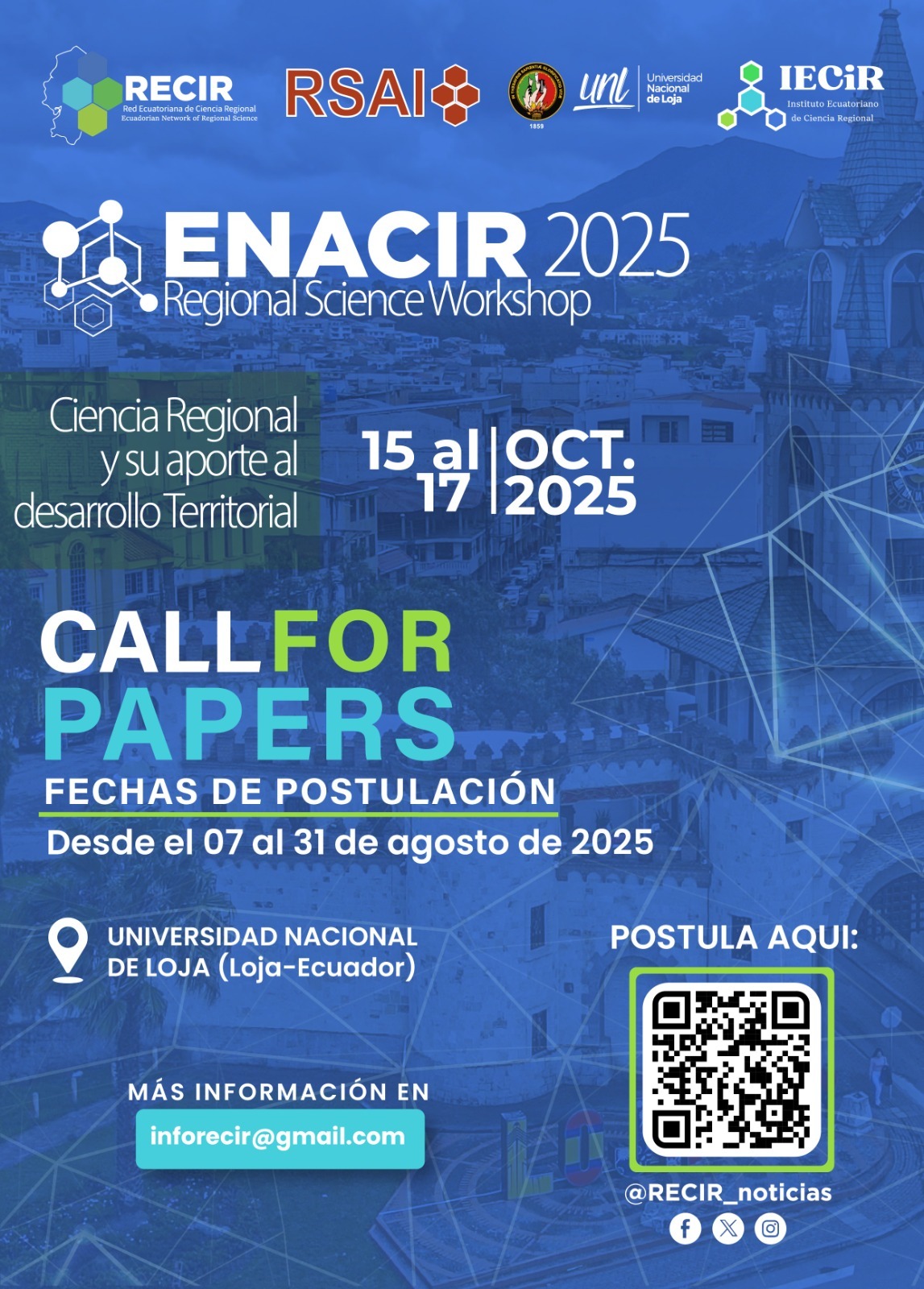
Ecuadorian Section: 2025 RECIR Regional Science Workshop, "Regional Science and its Contribution to Spatial Development", October 15–17, 2025, National University of Loja, Ecuador
In 2025, science, local public administration, and strategic sectors are coming together ? to collaborate with academia, local governments, the business community, international cooperation agencies, and civil society under the theme
✅ The Ecuadorian Regional Science Network (RECIR) invites researchers, professionals, and the wider community to participate in the 2025 RECIR Regional Science Workshop, to discuss topics around "Regional Science and its Contribution to Spatial Development."
This event will be held at the National University of Loja in October 15–17, 2025.
Call for Papers Open!
Submission Deadline: August 31, 2025
Apply here: https://easychair.org/cfp/ENACIR-2025
Invited senior researcher: Patricio Aroca, Ph.D, Universidad Nacional Andrés Bello, Chile.
Training courses: Metodología de Investigación con Inteligencia Artificial by Patricio Aroca and Metodologías de medición de accesibilidad espacial by Ergostats.
Don’t miss this opportunity to share your work, exchange experiences, foster collaboration, and align efforts toward sustainable territorial development across the region sponsored by RSAI.
More info at: https://recir.ec/

Prof. Luc Anselin (University of Chicago) is awarded the 2025 Jean Paelinck RSAI Award!
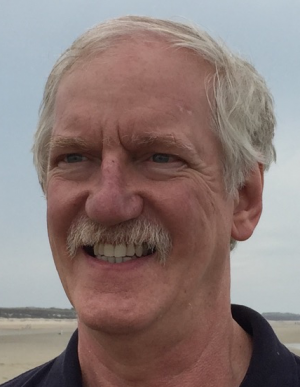 Prof. Luc Anselin, University of Chicago, USA, is awarded the 2025 edition of the Jean Paelinck award!
Prof. Luc Anselin, University of Chicago, USA, is awarded the 2025 edition of the Jean Paelinck award!
The Jean Paelinck committee, made up of Roberta Capello (chair), Budy Resosudarmo (PRSCO), Eduardo Haddad (LARSA), Juan Ramon Cuadrado Roura (ERSA), and Kara Kockelman (NARSC), provided the following motivation:
Luc Anselin is awarded the 2025 Jean Paelinck Award. The commission recognises Luc's outstanding contribution to regional science, especially in the field of spatial econometrics methods and techniques. Luc has marked a truly innovative pathway in his research activities, pioneering the formal integration of spatial dependence into econometric models at a time when such approaches were still marginal. His seminal work laid the foundations for what is now a thriving field of spatial econometrics, setting methodological standards that have since been adopted across a wide range of disciplines, from regional science and economics to political science, epidemiology, and environmental studies. Luc’s scholarship has been instrumental in transforming how we conceptualize and measure spatial processes, particularly through his development of local indicators of spatial association (LISA) and his rigorous treatment of spatial lag and error models.
Luc’s influence extends well beyond academic publications. He has empowered generations of scholars and practitioners through the creation of accessible, open-source software platforms like SpaceStat, GeoDa, and PySAL. These tools have democratized spatial analysis and enabled users worldwide to apply cutting-edge techniques in spatial econometrics with transparency and rigor. His intellectual leadership has been matched by a deep commitment to community-building, serving as director of key research centers, mentoring young scholars, and fostering interdisciplinary collaboration. Luc Anselin embodies the spirit of Jean Paelinck through his relentless pursuit of methodological clarity, his devotion to spatial analytical thinking, and his enduring impact on the scientific infrastructure of regional science.
New Issue: Regional Science Policy & Practice | Volume 17, Issue 8, August 2025
|
|
Articles
|
|
|
|
|
|
|
Book Review
|
|
New Issue: Papers in Regional Science | Volume 104, Issue 4, August 2025
NARSC 2025 CFP Extended to July 24
|
Romanian, Polish, Hungarian and Slovak Section: 9th Central European Conference in Regional Science (CERS), 27-29 November 2025, Cluj-Napoca, Romania
9th Central European Conference in Regional Science (CERS)
Sustainability-driven territorial development. Challenges for CEECs
27-29 November 2025, Cluj-Napoca, Romania
The Romanian Regional Science Association is pleased to announce that the 9th CERS – Central European Conference in Regional Science – “Sustainability-driven territorial development. Challenges for CEECs” – will take place in Cluj-Napoca, Romania, on 27-29 November 2025, being hosted by the Technical University of Cluj-Napoca, Faculty of Civil Engineering.
The conference is co-organized with the European Regional Science Association – Romanian Regional Science Association, Polish Section, Hungarian Regional Science Association and Slovak Section of the ERSA.
Further details and the Call for Papers will be announced in due course.
Keynote speakers:

More Information at https://www.cers.rrsa.ro/
About Us
The Regional Science Association International (RSAI), founded in 1954, is an international community of scholars interested in the regional impacts of national or global processes of economic and social change.

